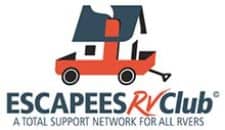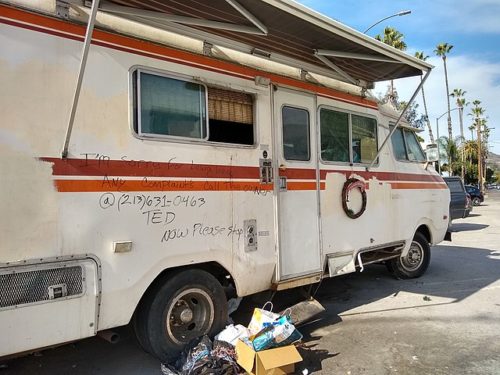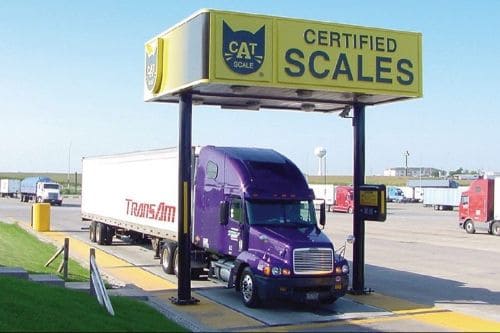A haven from work stresses, emails, texts, and general daily life is calling your name in the form of a camping adventure. But the truth is, it’s your first time diving headfirst into the world of camping like this and you do not want to end up having a more stressful weekend than you need to.
The first step after doing some research is to call the site. In today’s day and age, it is still the best way to plan ahead as looking at the website and emails may not be enough. So, you’ve got them on the phone, but what do you ask?
1. CHECK SITE ACCESS REQUIREMENTS
I’ve got [X] type of vehicle with [X] measurements. Is there anything I need to know or areas of concern for my vehicle on your campground property?
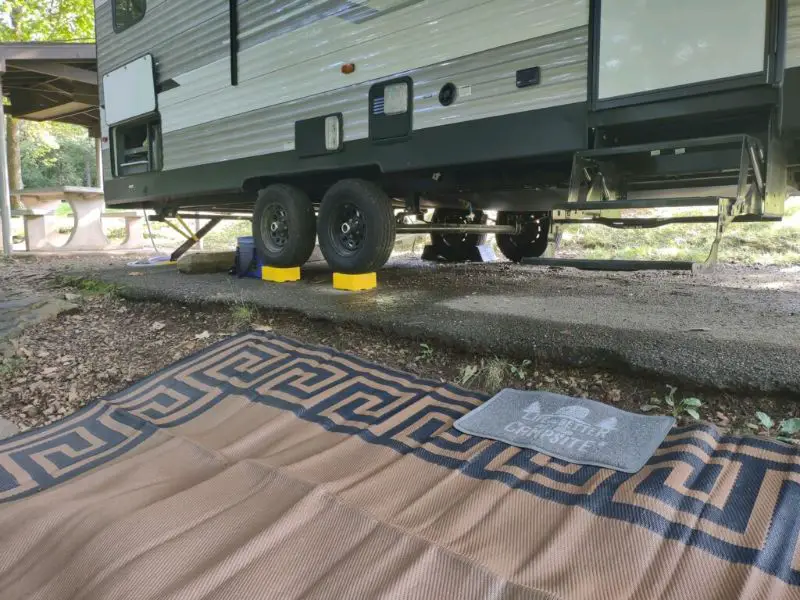
Whether you are bringing an RV or simply using your personal vehicle to go to a campground (either for primitive camping or renting out their camper that will stay on-site), this question is vital to understanding if this campground will be a good fit for you. Most campgrounds will have size limits on RVs and some restrict the type of vehicles allowed on-site or the number of vehicles per spot. Although it seems to be rare, some campgrounds have age limits on their RV so be prepared to answer this question as well.
They know their site well and will either be able to tell you areas to avoid with your vehicle or may need to go out and do some maintenance such as trimming trees if you have a tall or wide vehicle. If you are planning to bring a toad (a separate vehicle towed behind a motorhome), have a TT, or are bringing multiple personal vehicles, make sure that all of them will be allowed. Know your measurements of each!
If you are taking your personal vehicle, you may assume that it should be accessible, but you may need to double-check, especially if you do not have an off-roading vehicle. We recently took a camping trip with our Toyota Corolla (a four-door sedan) to a campsite that had campers and schoolies on-site to rent (they did not leave their spot).
Our car is very low to the ground and we were very worried that our car would not make it up the steep dirt road to our camper. In particular, there was a fork in the road that began the incline during the turn onto the left fork we needed to take. We scraped the bottom of the car and almost got stuck in the mud from rain that had pooled overnight. We made it and the road in general throughout our stay wasn’t as bad as we were worried about, but it is not fun to test your vehicle’s capabilities in the moment. Asking ahead of time would have prepared us better for that moment.
2. CONFIRM CAMPGROUND LOCATION AND DIRECTIONS
Is there anything I need to know about getting to your property or the check-in location? Does Google Maps find your property correctly?
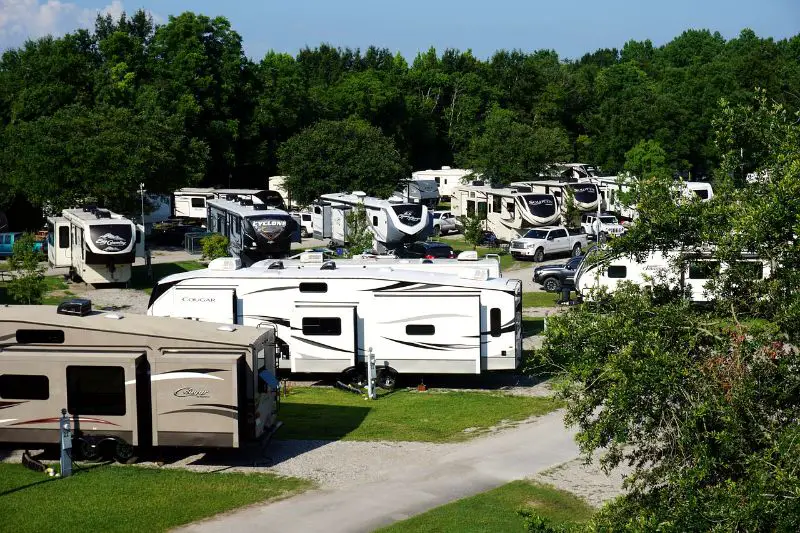
While map services are getting better and better, you’ve probably still gotten lost or at least had difficulty accessing your destination using your GPS recently. I know I’ve had to do a few U-turns and circles around locations to figure out how to enter effectively before even in the city. Campgrounds are also typically out in nature, increasing the likelihood that the directions might not be 100% accurate.
Most campgrounds will have signs to help direct you, but it’s good to know to be on the lookout for these landmarks ahead of time. In addition, the location where they want you to check-in may not be right at the front entrance. Asking ahead of time will reduce confusion as you come in which may be vitally important if you don’t have service on the campground and therefore can’t call to ask them where to go.
3. ASK ABOUT HOOKUPS
What hookups are available and how close are they to the camp spot? Is there anything specific I should know about them or are there any rules/ restrictions?
Depending on your vehicle’s setup, you may need access to different hookups. More primitive sites may offer some or none, while full hookups will include water, sewer, and electricity.
Electric
If a campground offers any hookups, it’s typically electrical while water and sewer are less likely. Make sure to get details about the electric hookups provided and what your rig requires.
- Some sites may only offer 30 amps while others may offer up to 50 amps which a Class A motorhome might draw.
- You may need a converter as 30 amp plugs have three prongs and 50 amp plugs have four.
- Always make sure everything is off before you plugin just in case and investing in surge protectors might be a good idea as well to protect your electronics.
Water
These hookups typically apply to water that you can use to refill your tanks. Be sure to confirm if the water is potable (drinkable) or not and having your own freshwater supply is always recommended. Even brushing your teeth and washing the dishes can be iffy if the water is guaranteed potable. A certified potable water hose is pure white in color, but ask ahead of time.
Sewer
These hookups refer to dumping your water waste tanks. While RVs with tanks have a sewer dump, they need to be emptied and a campsite with sewer hook-ups will mean you can dump all your sewer water on the campsite without needing to go to a dump station.
- You will need to consider both your greywater (wastewater from showers and sinks) and black water (waste from the toilet).
- Make sure you know the restrictions and how to use them! These can be confusing for first-time users, so make sure to ask for clarification. You do not want to be the person who messes up the sewer lines, causing a “poop pyramid” or flooding the campground with waste.
Not all campgrounds have hookups and there may only be certain sites on the grounds that have them. Arriving at a campsite assuming they have hookups could spell disaster for your trip if they don’t. Knowing the rules, restrictions, and where they are located in relation to your vehicle will help ensure that there are no accidents and less frustration when utilizing them. Plan to bring the appropriate hoses and power lines depending on how far away the hook-ups are.
4. WHERE WILL YOU PARK?
What is the parking situation? Will I be able to back in based on my vehicle size? How level are the parking spots? How close is my spot to amenities?
Where possible, it is highly recommended to back into a spot whether it is in a parking lot or on a campground as it makes getting out smoother. Knowing ahead of time if this is feasible, or if they prefer/ recommend you park in a different way or place is always good to know ahead of time to reduce confusion and frustration in the moment. Be sure to practice backing into tight spots ahead of time in a safe area to make this easier at the campsite, especially if the spot will be tight for your rig.
Many campgrounds will not be perfectly level. While it is always a good idea to have a few leveling blocks for your RV, knowing if the campground is fairly level or fairly unlevel will help you prepare how many to bring and get an idea of how long it may take you to level when setting up your RV for your stay.
How close your vehicle is to amenities/ other locations on the campgrounds will help you determine factors including:
- Length of and number of hoses and power cords for hookups
- Distance to bath/ shower houses if applicable
- Distance to hiking trails or other on-site experiences
- Distance to “office” for emergencies/ questions
- How close you are to other campground residents
5. DOES THE CAMPGROUND HAVE A SPECIFIC AMENITY?
What amenities are available? Is a pool or game room available?
This may be answered by the other questions, but it is worth asking again for clarification as having them list out their amenities specifically helps ensure that you know exactly what you are getting into.
If you have specific amenities that you need or want for the trip either ask about them specifically or make sure that they are specifically listed. Never assume that something will be available.
6. ARE CAMPFIRES ALLOWED?
Are fires allowed and if so, what on-site fire amenities are available?
Let’s be honest. One of the best parts of camping is having a fire, but the options and restrictions concerning fires can be drastically different depending on the campsite. Good questions to ask or make sure they address are:
- What type of fire is allowed? (wood or propane)
- How big are the areas designated for campfires?
- Does your campsite have a fire pit?
- Does it have a grill?
- Is firewood provided?
Knowing the setup and what they have will determine what you will need to bring to make sure you can have the fire you want. It’s always a good idea to bring your own matches, lighter, and even firestarter logs or sticks just in case. Even the most experienced firestarter can have issues due to natural elements they cannot control such as recent rain making tinder and kindling wet. If you want a fire, make sure to have these supplies just in case.
7. WHAT ARE THE CAMPGROUND ACTIVITIES?
Are there other areas available to us at your campsite such as hiking trails, playgrounds, pools, etc.? Do you have a map of your campsite?
While knowing the immediate area around your campsite is the most important, knowing the basic layout of the campground as a whole can be helpful as well. Many of the larger campgrounds have decent areas to walk around as well as even places like playgrounds and pools.
We recently stayed at a campground where the owner mentioned they have a decent amount of land for hiking, but to make sure we stayed on their property. Apparently, the neighbors have gotten upset in the past as campers have wandered off the campground and onto private property. This made us incredibly uneasy to walk around the grounds. We were worried about stumbling onto an irate neighbor as we never clarified this information. Having a clearer idea of where the campground boundaries were in relation to our campsite would have eased our concerns.
8. WHAT ARE THE NEARBY ACTIVITIES?
How close is the campsite to town/ local attractions?
Even if you are looking for a relaxing weekend in nature, you might be interested in checking out some of the local attractions in the area. However, campgrounds can greatly range in their distance to a local attraction. Some may be a quick twenty-minute drive from a city while others can easily be an hour away even if they seem relatively close on a map, due to rural roads and driving conditions.
Knowing the actual distance and travel time between the campground and the local attractions you are interested in seeing will help determine if that is the campground for you or if you need to change the expectations of your trip to just staying on the campground.
9. DO YOU OFFER LONG-TERM RENTALS?
How easy is it to get in and out of the campground to visit local attractions or restock? In other words, do most people go out to visit other places while staying with you, or do they typically stay on the campsite for the duration of their stay?
Sometimes the issue with going to the local attractions is not simply the distance/ travel time, but getting out of the campground. Many campgrounds are designed intending for their residents to hunker down for their stay as opposed to going in and out multiple times. They may want to reduce traffic on their roads as well to keep everyone safe.
When we rented the camper at the campground, we started following the owner up the road, but very quickly were told to back up as there was another car coming out. The road was not a loop, but a single lane that was used for going up and down. That, in addition to the condition of the road with our Toyota Corolla, terrified us of the possibility of getting halfway up or down the hill to meet another car going the opposite direction. That ended up being the only time we met another car on the road, but it was certainly another scary prospect added to our trip. If we had known this ahead of time, we would have made sure to prepare enough to remain at the campground until the end of our stay.
10. ARE PETS OR CHILDREN ALLOWED?
Do you allow pets and children? Are there any restrictions/ rules regarding pets?
Many campgrounds have rules regarding pets. Some may not allow them at all while others may have restrictions including:
- How big the animal can be
- Where the animal can go on the property in general
- Where the animal can do their business and how you clean up after them
- The comfortability of other campers
While most campgrounds won’t bar children, it’s worth bringing up if you have children coming along. They may recommend a certain site including:
- A more secluded campground
- One closer to a playground, pool, etc if they have one
- One closer to the shower/ bathhouse to help with bathroom and shower trips
Checking ahead of time will help make sure that your stay goes as smoothly as possible and hopefully won’t disrupt anyone else.
11. WHAT TIME IS CHECK IN/OUT?
What are your check-in and check-out procedures?
Many campgrounds have very specific check-in and check-out procedures. You may need to:
- Arrive by/ before/ at a certain time for someone to be available
- Go to a certain location on-site when you first arrive
Receive an orientation on both the campground and your specific campsite. - Pay all or part of your fees upfront
- Register your vehicle and confirm the number of people so the campground has up-to-date information in case of an emergency
- Follow a check-out cleaning/ resetting the campsite procedure
- Have a representative inspect your site before leaving
- Pay all fees in person at the end of your stay
Check-out by/ before/ at a certain time
What are potential issues at check-in or check-out? This may prompt conversation such as how some people experience unexpected fees when they don’t follow the cleaning procedure.
12. WHAT ABOUT EMERGENCIES?
If the trip does not go as planned and we are arriving earlier or later, will there be any issues, and what are the procedures/ best ways to get a hold of you?
As stated above, many campgrounds may either have a specific check-in time or need to plan to have someone onsite for you when you arrive. Therefore, if something happens on the road and you are running late (as can often happen, especially on your first RV trip), you need to know the procedure.
While typically not as big of an issue, you will also want to know what to do if you are running ahead of schedule. Will someone still be available even if you arrive earlier than planned? Is there a time you should not arrive before? If so, is there a recommended place on the way that you can kill some time or restock until the check-in time?
In general, always call on the road when you realize you are going to deviate from the originally scheduled ETA and have a new estimated ETA. However, it is helpful to know general guidelines ahead of time in case you have a hard time reaching them on the day.
13. WHAT ARE YOUR CANCELLATION POLICIES?
What are your cancellation policies? Is there a grace period or cancellation window?
This is so important to know. It is always a good idea to book a place ahead of time and early, so what happens if plans change?
- Will you get a full or partial refund if you cancel by a certain number of days or hours before your scheduled arrival?
- Will you be charged a fee for canceling last minute?
- Is there a specific way you have to cancel to receive the refund or not be charged the fee? (i.e. calling vs. emailing)
- What if you’ve established that your vehicle will struggle on the dirt roads if it rains and a massive storm is expected for that weekend?
- What if you have to leave a day early or unexpectedly in the middle of the night because your dog is traumatized by unexpected fireworks? (our campsite neighbors had to do this on a recent trip)
- Is there anything else we should know?
14. HOW GOOD IS YOUR WIFI INTERNET?
Is there a spot on the campground that typically gets service?
While you are typically looking to escape the hectic real world in the beauty of nature when you book a campsite, you may need to let the real world in a little. For instance, you may want to be able to check phone calls or emails once a day on the trip to help alleviate the onslaught when you get back home.
Is there a place on-site that works for most people? Would you be able to access a hotspot or internet connection even if it’s for a fee? As more campsites are upgrading to today’s customer needs, they may have an option for you. If this is something that needs to happen, you want to know if the campground offers this option ahead of time. Otherwise, you may need to plan to go into town on a regular basis to get a signal and need to make sure that is doable.
15. I’M A FIRST-TIME CAMPER …
This is my first time camping (like this). Based on everything we have talked about and your own knowledge, do you have any recommendations for our time there?
This may include specific campsites/ areas on their campground, packing tips, setting expectations, etc. While they may have already addressed some of these concerns thanks to the above questions, it is a good general question to ask before you hang up. They know their campground and the issues and complaints that visitors before you have had. They may just give you that one piece of trip-saving advice that you would never think to ask.

Sarah Hoffschwelle
Sarah Hoffschwelle is a freelance writer who covers a combination of topics such as science, self-development, art, and societal commentary. In the past, Sarah worked in educational nonprofits providing free-choice learning experiences for audiences ages 2-99.



